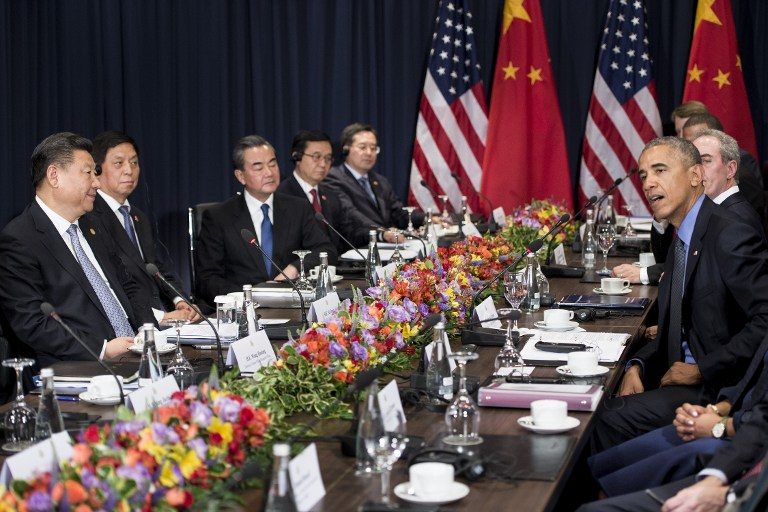SUMMARY
This is AI generated summarization, which may have errors. For context, always refer to the full article.

LIMA, Peru – Asia-Pacific leaders are expected to send a strong message in defense of free trade Sunday, November 20, as they wrap up a summit that has been overshadowed by US President-elect Donald Trump’s protectionism.
The broad consensus at the Asia-Pacific Economic Cooperation (APEC) Summit, which features some of the world’s most powerful leaders on both sides of the Pacific, is that free trade is a force for good.
But the assembled leaders – US President Barack Obama, China’s Xi Jinping, Russia’s Vladimir Putin, Japan’s Shinzo Abe, and others – are under pressure to defend that view against a rising tide of populist, anti-globalization sentiment in the United States and Europe.
The summit in Lima, Peru was briefed Sunday morning on the state of the world economy by International Monetary Fund chief Christine Lagarde. Leaders then held a meeting on “challenges to free trade and investment.”
The summit will issue its closing statement later in the day, seeking to live down old jokes that APEC is “4 adjectives in search of a noun and a verb” – an ill-defined group that struggles to take decisive action.
A draft version of the statement seen by AFP praises open markets, denounces protectionism, and warns that curbing free trade will slow the ongoing recovery of the world economy.
It is a far cry from the fiery language and visceral appeals Trump used on the campaign trail to appeal to working-class supporters who feel globalization has made them worse off.
The brash billionaire’s attacks on free trade deals and vows to cut back the US role as “policeman of the world” are causing jitters in the Pacific Rim, where Washington and Beijing compete for influence.
Trump has vowed to kill Obama’s signature trade initiative in the region, the Trans-Pacific Partnership, or TPP – an arduously negotiated 12-country agreement.
He campaigned against the proposal as a “terrible deal” that would “rape” the United States by sending American jobs to countries with cheaper labor.
In a region hungry for trade, this has left even longtime US allies looking to a once unlikely place to fill the void: China, which was excluded from TPP.
China’s Xi has set himself up as the anti-Trump at this week’s summit, defending open markets and offering leadership on other trade agreements to rival TPP.
That has made it an uncomfortable summit for Obama, who is facing awkward questions from allies about the future of US policy in his last foreign visit as president.
Despite attacking Trump as an unfit successor during the campaign, Obama urged the world to give the president-elect time to get his feet under the desk.
“How you campaign isn’t always the same as how you govern,” he told a town hall meeting of young Latin Americans in Lima, defending democracy even as he admitted it can be “frustrating.”
‘Trump Pacific Partnership’?
It is unclear whether there is any future for the TPP.
Some experts say Trump’s attacks on the agreement and his Republican allies’ control of Congress mean it is dead in the water.
Others say the deal-making real estate mogul could negotiate a number of changes and then claim credit for turning it around.
New Zealand Prime Minister John Key joked Saturday, November 19, that it could be rebranded the “Trump Pacific Partnership.”
Singapore’s Prime Minister Lee Hsien Loong said he was hopeful TPP would survive the unexpected “twist in the road” presented by the US election.
“I share President Obama’s hope that after the new administration has settled in, deliberated on the matter, and taken advice, it will in due course take a considered decision,” he said.
“In the meantime, the other TPP partners should carry on with the ratification process.”
Alternatively, China is backing a free trade zone across APEC – a 21-member group that accounts for nearly 40% of the world’s population and nearly 60% of the global economy.
It is also pushing a 16-member Regional Comprehensive Economic Partnership (RCEP) that excludes the United States. – Rappler.com
Add a comment
How does this make you feel?
There are no comments yet. Add your comment to start the conversation.